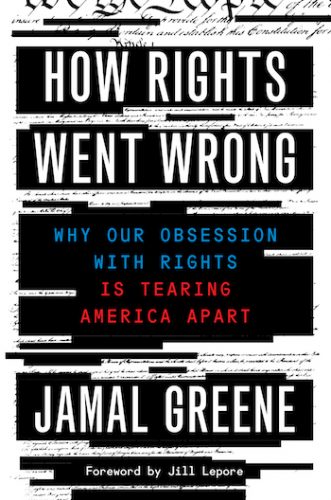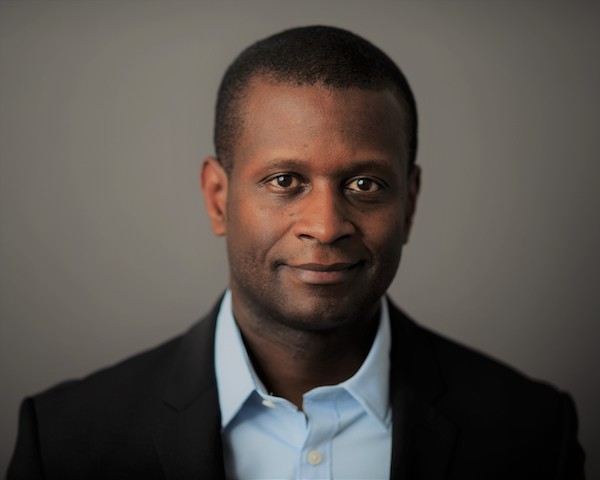Author Interview: Talking to Jamal Greene about How Our Demand for Rights Went So Wrong
By Blake Maddux
“‘Rightsism’ gives judges much more power than they deserve in a democracy,” Jamal Greene writes. “When U.S. judges face a conflict of rights, they cancel one right or the other.”
How Rights Went Wrong: Why Our Obsession With Rights Is Tearing America Apart by Jamal Greene. Foreword by Jill Lepore. Houghton Mifflin Harcourt, 299 pages, $28.

Professor Jamal Greene’s first job after graduating from Harvard was a three-year stint as a reporter for Sports Illustrated. Half a dozen years after leaving that job in 2002, his résumé had grown to include graduate of Yale Law, clerk for Judge Guido Calabresi of the Second US Circuit Court of Appeals and Supreme Court Justice John Paul Stevens (click for my Arts Fuse review of Stevens’s book Six Amendments), professor at NYU School of Law, and Dwight Professor at Columbia Law School, where he currently teaches US and comparative constitutional law.
Recent additions to his CV include aide to then-Senator Kamala Harris during the Brett Kavanaugh hearings (the ever-conciliatory Donald Trump described her star-turn questioning as “extraordinary nasty”), current co-chair of the Facebook Oversight Board (which will decide if the ex-president ever gets to use Facebook and Instagram again), and — with this week’s publication of How Rights Went Wrong – first-time author.
In her foreword, Harvard historian Jill Lepore puts herself in the position of what Professor Greene sees as a regrettably common plaintiff: “Instead of seeking political change in pursuit of my interest in the realm of political debate and the making of law…my remedy is to claim that my interest is not an interest but a right. You do that, too. And then we go to court…where the winner takes all.… [T]he courts decide whose rights win based on each judge’s preferences. This is neither fair nor democratic.”
Greene sees what Lepore calls an “absolute and unrelenting” battle of, to quote the title of a song by The New Pornographers, “my rights versus yours,” as constituting a phenomenon that he calls — using a word that he “made up” – “rightsism.”
“‘Rightsism’ gives judges much more power than they deserve in a democracy,” Greene writes. “When U.S. judges face a conflict of rights, they cancel one right or the other.”
“By denying the loser any claim of rights,” the author continues, “the court tells him not just that he has lost but that he does not matter.”
Greene will be discussing How Rights Went Wrong in upcoming virtual events hosted by Harvard Book Store (for which Lepore will join him) and Boston Athenaeum (for which he will converse with Randall Kennedy of Harvard Law).
Before these, however, he spoke to me by phone on the eve of the book’s publication.
The Arts Fuse: How do you distinguish between caring deeply about rights and having an “obsession” with them?
Jamal Greene: I would start by saying that I also care very deeply about rights. The book is not an attack on the notion of rights. What I would say about obsession is it’s a kind of fetishization, so that the only thing that matters is whether I have a right to do something. You have to treat my rights really seriously, but we also live in a society, and if everyone’s rights are treated seriously, that means that no one’s rights can be absolute because our rights are going to come into conflict with one another’s. In some sense, the way to protect rights is to mediate between them. Obsession is a little bit sensationalistic, I get that, but it implies a certain irrationality. That you pursue the individual right even if the heavens fall. Legal decision makers can’t think about rights that way and the rest of us shouldn’t either.
AF: What are mediation of rights and “rightsism”?
JG: Mediation is something that people who try to resolve disputes do all the time. What I’m trying to emphasize by using that term is that controversies about rights are just disputes that need to be resolved. We tend to kind of think of them in more existential ways. That we have to pick one person’s values over another person’s values. But just like mediators try to figure out what people have in common, they try to figure of out where the consensus is and where the disagreement is and then focus on the disagreement, which tends to be more narrow when you think about what people have in common.…
Rightsism is a related concept, which is discrimination between rights. So let’s say there’s a conflict over campaign finance. One side is saying people have the freedom of speech, which gives them the right to decide how much to spend on political campaigns. The other side is saying people have the right to participate in elections in roughly equal terms, so if you don’t restrict how much money people spend it’s not going to be equal. So when you get that kind of conflict, you can think of the judge as having to decide whether the value of free speech or the value of political equality is more important. That’s rightsism: picking one or the other, and the courts have quite clearly picked freedom of speech in that context.

Author Jamal Greene: he’s much more attracted to solving problems than in arguing about who’s right about something. Photo: courtesy of the artist.
AF: How did you develop the idea of rightsism?
JG: I think by temperament I tend to be someone who is much more attracted to solving problems than in arguing about who’s right about something. So often we see legal decision makers avoiding the really important questions and asking about what did the framers think, how important is speech, and those kind of questions are not really what our modern disputes are about.
Words like fetish and obsession come to mind because what we end up doing is thinking, “I’ve got the right to freedom of speech, and therefore I’m going to be as provocative as I can possibly be.” There’s something about the vindication of the claim to a right that makes us no longer cooperate with each other.
So the book is trying to think about how political and legal decision makers can dial the temperature down in the way they talk about these things.
AF: Is the Constitution able to facilitate this process?
JG: We have a very open-ended Constitution when it comes to rights. The US Constitution is the second-shortest constitution in the world. We don’t have a long list of rights. Most of the things we argue about are couched in very broad terms. In a typical high-octane conflict — over abortion, guns, affirmative action, free speech — both sides are trying to vindicate rights. These kind of values conflicts that drive us into our respective corners are conflicts in which there are constitutional values on both sides of the dispute.…
To say that you resolve the conflict by deciding which one is right is one particular way of thinking about decision-making, and that’s not compelled by the Constitution. The Constitution is flexible enough to say that we have to optimize rather than maximize, which means thinking about whether there are ways of respecting the values of both sides and nonetheless resolving the conflict in a decisive way. So all of the book is about when you live in a pluralistic society, recognizing that there are constitutional values all around us and not just on one side or another.
AF: You give examples in the book of how other countries have avoided rightsism. Why is it prevalent in the US but not in certain other places?
JG: The way that American law has come to think about rights disputes is pretty unique to America. What those places get right is not feeling the need to pick one side or the other. I think that a big piece of the American approach is that we ground our tradition of legally enforceable rights in the Civil Rights Movement. The rights tradition that we understand ourselves to live with today is Brown v. Board of Education: protecting the rights of minorities against the majority.
The problem with that is that that situation involved pathological, untrustworthy governments. It’s not a matter of balancing or mediation between segregationists and white supremacists and the people whose citizenship they’re denying. That’s not how rights arise in most cases. They arise in most cases because someone is trying to govern in some way. Someone passes a public safety law and someone else says, “hey, but I’ve got the right to bear arms.” That kind of conflict is not the same as the Jim Crow South. It’s just a clash of values that are legitimate on both sides.
We need a language that takes us out of the idea that rights arise out of pathologies and evil governments and into dealing with rights when they arise just as a byproduct of ordinary government. How do we protect people’s right and still commit ourselves to self-government? I think we’re still kind of struggling in the US to figure out the right language with which to do that.
Blake Maddux is a freelance journalist who regularly contributes to the Arts Fuse, the Somerville Times, and the Beverly Citizen. He has also written for DigBoston, the ARTery, Lynn Happens, the Providence Journal, The Onion’s A.V. Club, and the Columbus Dispatch. A native Ohioan, he moved to Boston in 2002 and currently lives with his wife and one-year-old twins–Elliot Samuel and Xander Jackson–in Salem, Massachusetts.

Incredibly important insight provided here, sharing of this understanding and perspective could transform us in a very positive and healthy manner.